Pink capes, wigs and no slurs: L.A.’s Angel City and its fans are building an inclusive space
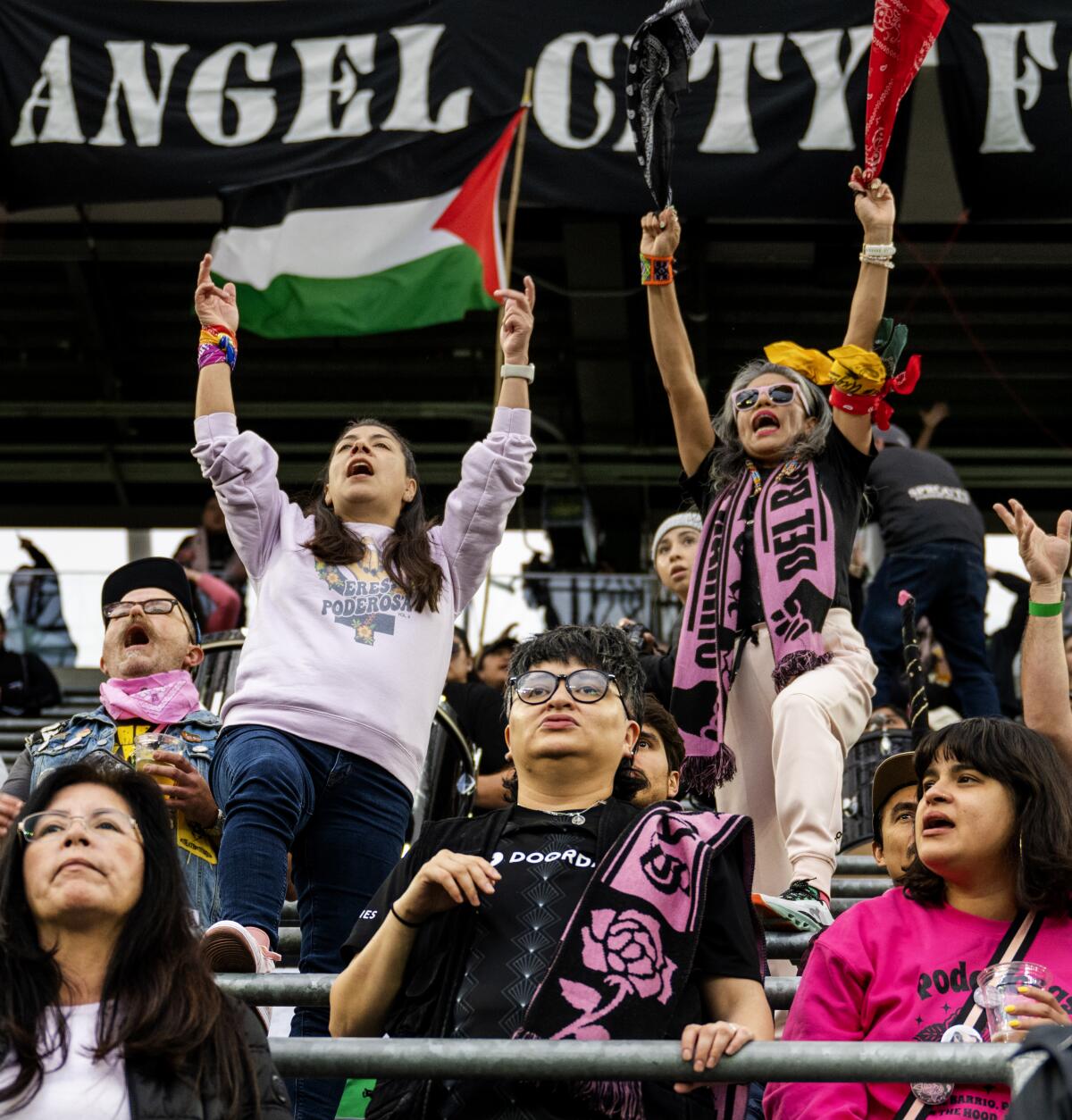
- Share via
When Emily Grijalva was growing up, her uncle would take her to men’s soccer games in Guatemala. She would stand on his shoulders and take in the chaotic atmosphere. Many of the men sitting around her were drunk, she remembers, and they would yell slurs from the stands.
“Don’t repeat anything you hear,” she remembers her uncle saying.
For the record:
10:31 a.m. July 11, 2023An earlier version of this article misspelled the last name of Angel City fan Alex Rojas as Alex Ramos. It also misspelled the last name of Relentless Ladies organizer Ben Skolnik and his 6-year-old daughter, Leila, as Scolnik.
Back then, Grijalva, who was born in L.A. and later went to school in Guatemala, didn’t know much about soccer, but she enjoyed spending time with her uncle, who helped raise her. Now, at 39, she says soccer is the way she lets go. She has a women’s soccer team she follows religiously, close to her home in Boyle Heights: Angel City FC.
In June, she attended the team’s match against the Chicago Red Stars at the BMO Stadium in downtown L.A. The thousands of excited fans that poured into the stadium alongside her were very different from those she saw at soccer games in her youth, though. Some wore bright pink capes, eye shadow and wigs, while others held signs naming their favorite players. Grandparents, tween soccer teams and young professionals navigated the busy stands, careful not to drop their hot dogs and popcorn. Grijalva wore a T-shirt inscribed with the names of Black authors to commemorate Juneteenth.
They made their way to their seats, quieting down to pay attention to the announcements. When the referee blew the opening whistle, pink smoke engulfed the stands and the stadium came alive.
Although Angel City is in just its second season, Los Angeles’ only women’s professional soccer team has amassed a substantial and diverse following. Around 19,000 people attend weekend home games, according to Angel City FC Head of Community Catherine Dávila, filling the stadium up to 86% capacity with a sea of pink and black, the team’s colors.
Grijalva is part of the liveliest group of fans, who congregate in the stadium’s north section. Recently named “La Fortaleza,” or the fortress, it houses Angel City’s six official supporter groups, who devotedly follow the team at home and away games. Their section doesn’t quiet until the last players leave the pitch.
Drummers and capos guide those in the stands through energized chants that echo throughout the field as supporters dance and wave flags, which often match up with the games’ themed nights. On June 12, it was Juneteenth. Next up was Pride night, on June 25; July 9 was “Global LA” night.
For these dedicated supporters, holding season passes is about more than just wanting their home team to win. Longtime soccer fans, activists and families say they created the six groups to build a fan community that redefines what it means to go to the stadium. Although they sometimes differ in their priorities — community service, diversity and social justice, friendship-building or creating a safe environment for children — the groups collaborate with one another and with Angel City FC to craft a place that is more representative of L.A.
“What you see, and this has been very intentional alongside our supporters, is the creation of a space that differs very dramatically from a lot of male-dominated sports, where not everyone always feels included, safe or welcome,” Dávila said. Men’s pro soccer has been marred for decades by hooligan violence and racist and homophobic chanting — behaviors frowned upon in Angel City games and rare in the National Women’s Soccer League in general.
“A lot of the people who raised their hands first” — to support Angel City — “were people who said, ‘I haven’t had a space that was just mine in sport, and this feels like that opportunity,’” Dávila said.
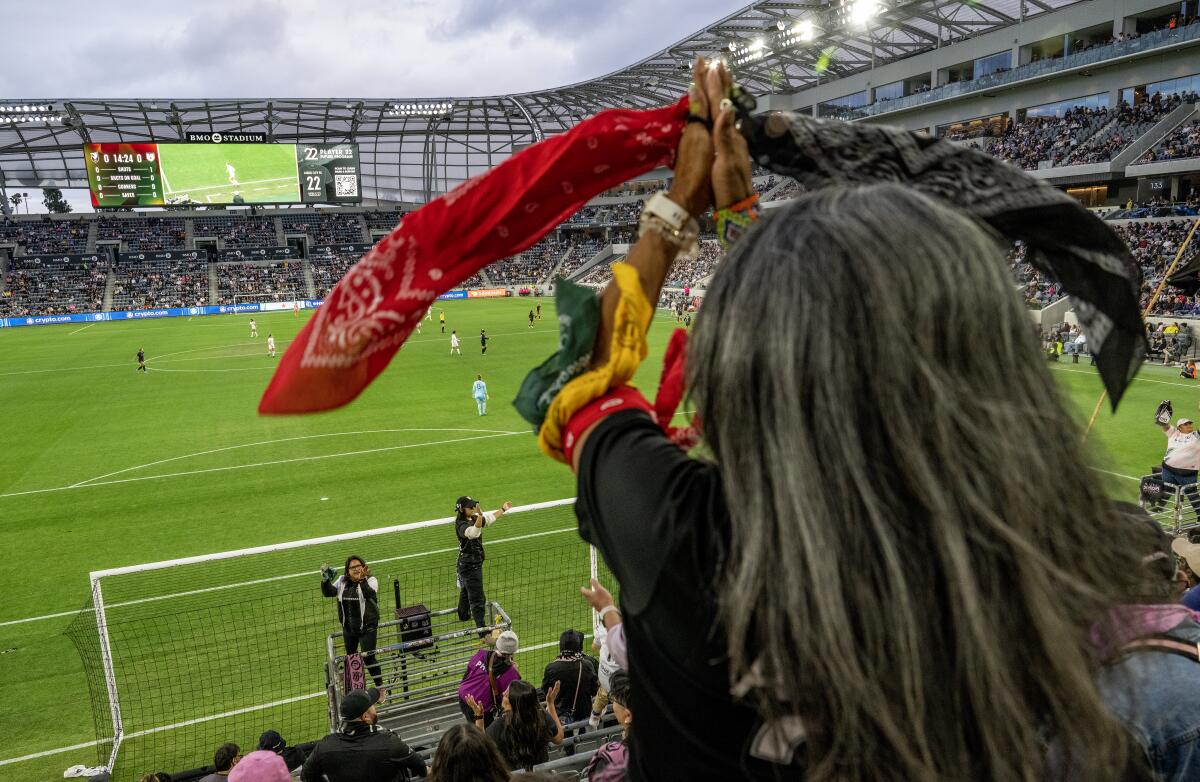
Some supporter groups have been working to craft this community since before Angel City existed. While preparing to attend the 2019 Women’s World Cup — won by the United States — Culver City residents and soccer fans Mark Rojas, 36, and Lindsay Rojas, 31, wondered why they had to travel halfway around the world to see a women’s team. They took a banner to the games in Paris, kick-starting a grassroots campaign to add an L.A. team to the NWSL.
When they got back to L.A., they held up signs at local men’s soccer games and circulated a petition that received more than 1,700 signatures, which Mark Rojas said eventually caught the eye of Julie Uhrman, one of Angel City’s co-founders.
After Uhrman’s majority women ownership group (which includes actor Natalie Portman) announced in July 2020 it would bring Angel City to L.A., Mark Rojas said, his campaign morphed into a supporter group for the new team: Rebellion 99. The leadership of the only nonprofit supporter group now runs fundraisers and donation drives to support community initiatives across the city, such as helping domestic violence survivors and transgender youth. They also make sure to be present at every game, chanting and cheering along with everyone else in the stadium.
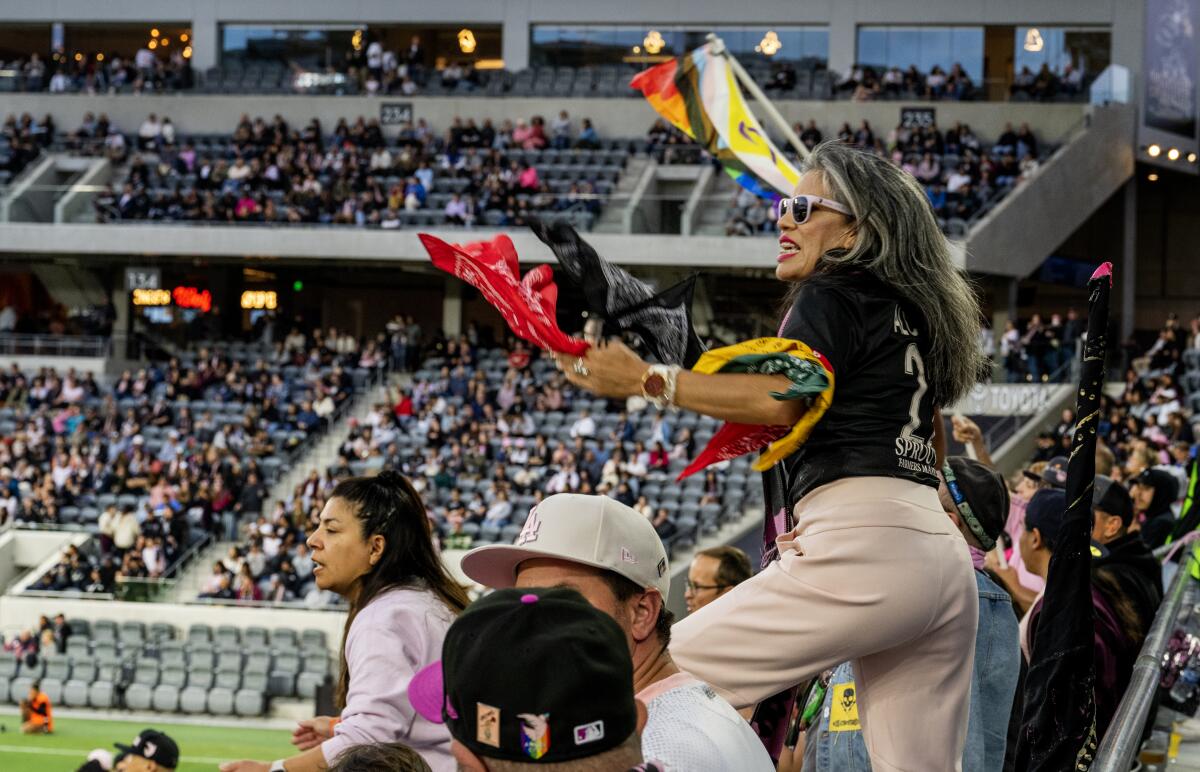
As the match against Chicago picked up momentum, one group energetically waved black flags with pink roses and banners advocating LGBTQ+ rights. “Dale, dale, ACFC. Dale, Angel City,” they sang in Spanish — “Go on, go on, ACFC.”
“Forever we are loud and bold,” went another chant.
They were the PodeRosas — a play on the Spanish words for “powerful” and “rose” — a supporter group based in Boyle Heights made up of activists and queer Latina women.
“Soccer is political, and just because we love and enjoy the sport doesn’t mean that it can’t be a platform to elevate issues that are impacting our communities,” said Grijalva, who is part of the group’s leadership. Forming a support group for Angel City, Grijalva continued, “we were excited at the idea that we could help influence and build a culture that would be women-centered, women-led and family-friendly while still maintaining that idea of soccer being a platform where we can advocate for community issues.”
For Angel City’s Juneteenth celebration, the PodeRosas made a large banner to support Black lives that they hung over La Fortaleza. Some members also wore bandannas with the colors of the Black liberation flag. Grijalva said that at other games the group has collaborated on visual demonstrations across the north section, such as using green bandannas to advocate for reproductive rights, holding paper flowers to celebrate Latinx culture and wearing orange to denounce gun violence.
Increased representation and accessibility is something the PodeRosas often push for in conversations with Angel City leadership, Grijalva said, as many supporters weren’t allowed to play soccer in their youth because of their gender, or couldn’t continue playing because of systemic barriers. They share their mission with Mosaic 1781, another female-led supporter group that wants to make the pitch and stands reflect the diversity of Los Angeles.
“Growing up I wasn’t always welcome in the space of the soccer community as a woman, so it was really important for me to be a part of a group that strives to increase representation, to increase the access to women’s soccer,” said Mosaic 1781 member Alondra Espinosa, 34, who wore a pink Mosaic 1781 scarf and hat and held a Juneteenth banner. “It’s really important for me to continue that work, to show others that have been underrepresented before in this field that they are welcome and that they can be a part of this.”
Parts of the front rows of La Fortaleza are sectioned off to create a safe space for young girls and boys cheering loudly for their team.
Six-year-old Leila Skolnik waved a black-and-pink flag animatedly, jumping up and down whenever the ball got close to the net. She and the other kids are part of the families that make up Relentless Ladies, an Orange County-based supporter group.
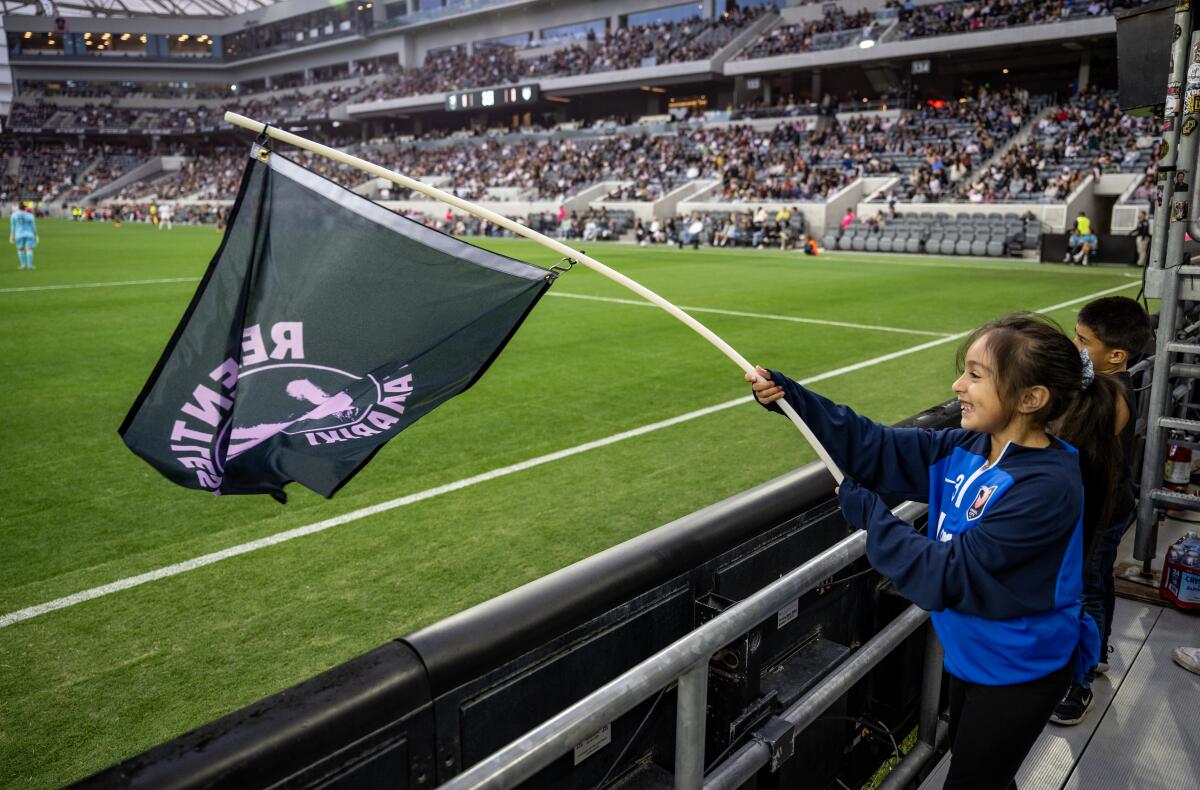
Relentless Ladies started as a support group for the Los Angeles Football Club, known as LAFC, said organizer Ben Skolnik, 43, Leila’s father. But when he learned about Angel City, he and his wife, Imelda, decided to shift their family’s focus to the new team.
“We thought it was actually something cool for Leila to see positive role models on the pitch,” Skolnik said. “She was used to watching players like Carlos Vela on LAFC, but to have girls, women playing, that is a dream that she can possibly attain.”
Bethany Anderson, 37, a chant leader, said her family also enjoys the street fairs that Angel City hosts outside the stadium before every game. The booths, street food vendors and lively music build “excitement and such a powerful atmosphere,” she said.
Some makeshift families have been formed in the stands. With many groups traveling together to away games and hosting watch parties, tailgates and community-focused events, members have ample opportunities to bond with one another, over soccer and life.
For Karen Tellez, 34, who wore a signature white mariachi sombrero she got in celebration of Angel City signing Katie Johnson, the team’s first Mexican American player, the chaotic “bunch of goofballs” that make up supporter group AC Pandemonium have become some of the people that she feels the most comfortable with.
“It’s the first place I felt very safe and welcomed,” Tellez said. “I’m part of the LGBT community and I came out to them before I came out to my family or friends.”
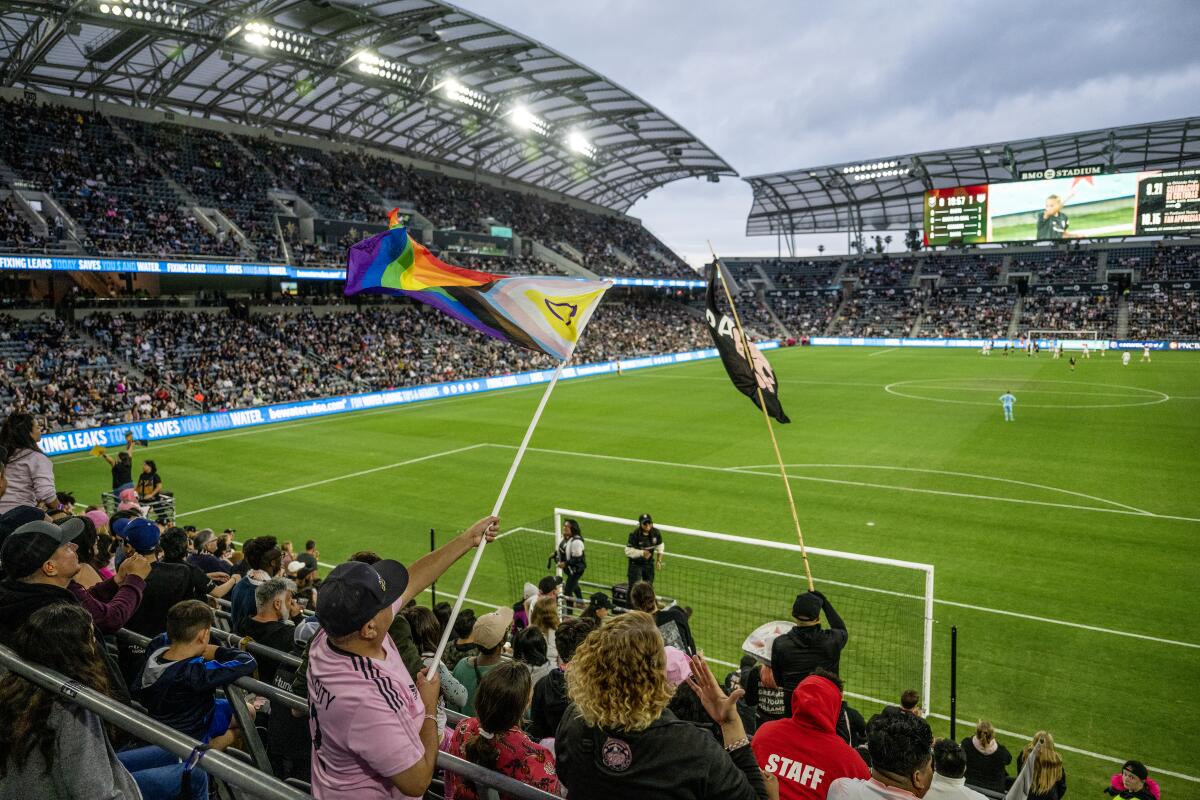
Alex Rojas, 33, said she met her current roommate through the AC Valkyries, a supporter group made up of comic book and women’s soccer fans.
“The atmosphere is unheard of in NWSL. I met half of the people I know nowadays through Angel City,” Alex Rojas, who was sporting a brand-new Alyssa Thompson jersey, said. “It’s brought in a lot of friendships [because] we’re with like-minded people, we’re all here and we love football. The sense of community is what brought me in and it’s what keeps me in.”
Holding up printed memes every time he thinks the referees made the wrong call, El Monte resident JT Rodarte, 39, said it’s been rewarding to devote part of his life to shape the “welcoming and passionate” culture of the stadium.
“It’s soccer and Angel City, but it’s about growing something. It’s one thing if you become a fan of an established venture,” said Rodarte, a longtime soccer fan and member of Rebellion 99. “But there’s also something to helping a venture grow and developing and creating a culture out of nothing that was there before. ... You don’t get many opportunities to do something like that.”
When the game ended, many of the younger fans from across the stadium stayed behind. They gasped excitedly as their favorite players approached the stands to autograph signs or take group selfies. Many exchanged words with their idols, who are not much older than they are, but now play to represent them.
“For a lot of them, now the reality is, ‘I could do this. I could be this at some point,’” said Rebellion 99 President Tory Lathrop, 42. “And I think that’s pretty important.”
More to Read
Sign up for Essential California
The most important California stories and recommendations in your inbox every morning.
You may occasionally receive promotional content from the Los Angeles Times.














